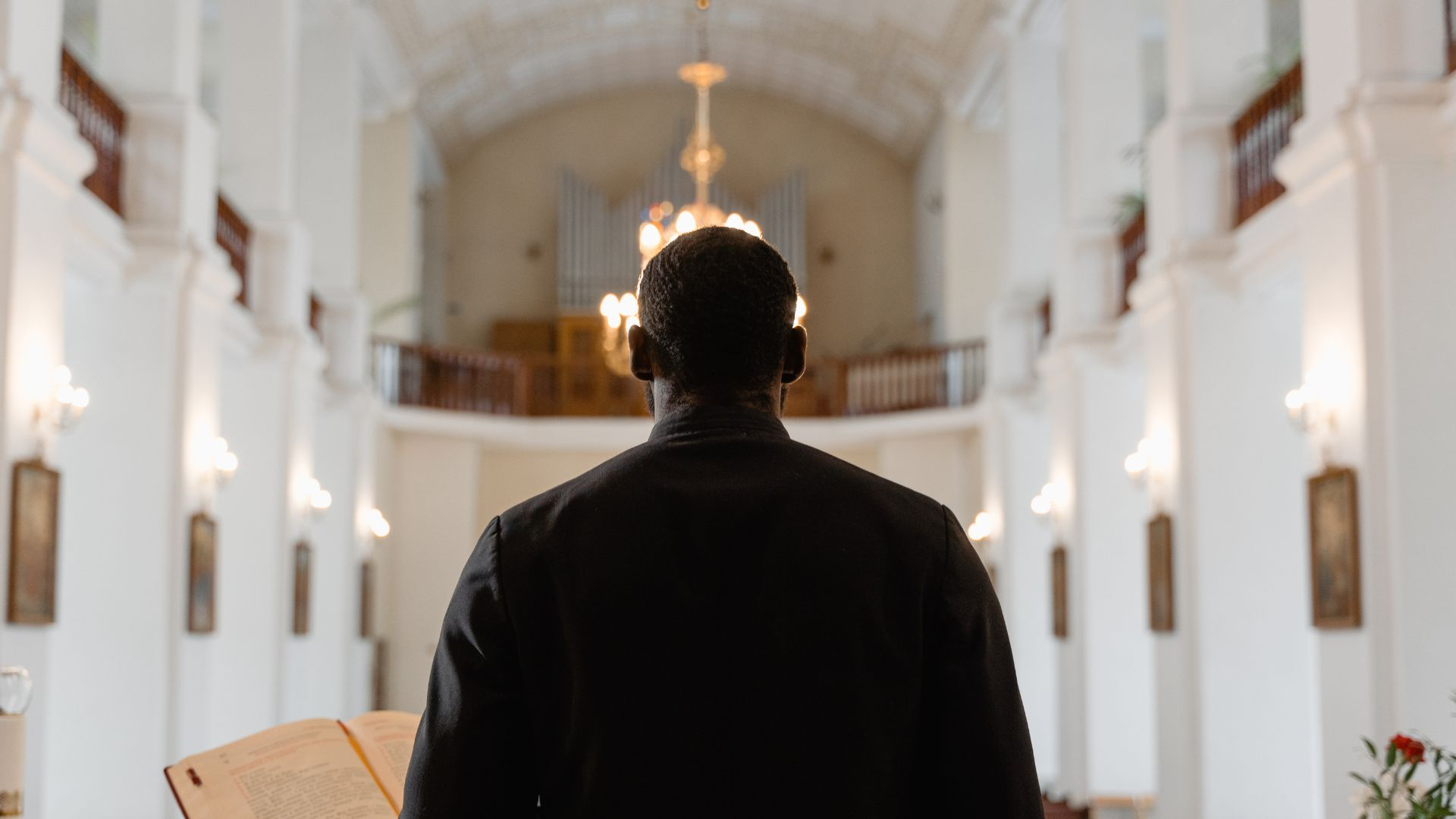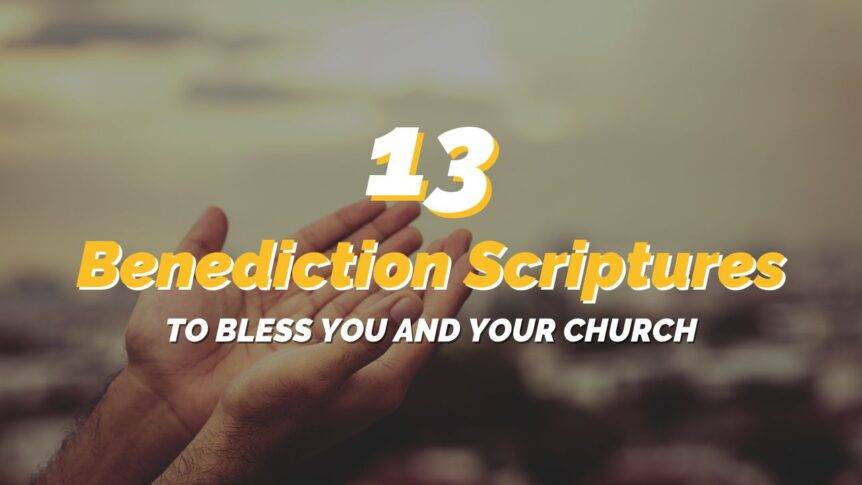Benedictions, sometimes referred to as blessings or well-wishes, hold a unique place in the hearts of Christians seeking solace, inspiration, and spiritual guidance. Throughout history, benediction scriptures have played a powerful role for Christians. They offer Biblical blessings of comfort and hope in times of need and celebration.
In this article, we will delve into the world of popular benediction scriptures found within the pages of the Bible. These sacred verses have transcended time and continue to touch the lives of millions around the world.
The purpose of this article is to provide you with the most powerful benedictions in the Bible. Maybe you are a pastor looking for a blessing to begin or end your sermon with. Perhaps you are a song writer looking to incorporate a blessing into your next worship song. Maybe you just need the blessings from the Word of God to inspire you.
Whatever the case, we hope you enjoy these 13 powerful benediction scriptures. Let’s dive in.
Estimated reading time: 11 minutes
Table of contents
What is a Benediction?

A biblical benediction is a type of blessing expressed in the context of the Bible. These benedictions are found throughout both the Old and New Testaments and are often used to convey blessings, encouragement, and divine favor to individuals, groups, or communities.
Biblical benedictions are typically associated with religious or spiritual gatherings and are delivered by figures of authority within Christian faith, such as priests, apostles, or religious leaders.
Key Characteristics
Most benediction verses share similar characteristics, as shown below.
- Blessing: The primary purpose of a biblical benediction is to bestow blessings or positive wishes upon the recipients. These blessings can encompass a wide range of spiritual and temporal aspects, including peace, grace, love, guidance, and divine protection.
- Scriptural Context: Biblical benedictions are, by definition, drawn from the Bible itself. They are embedded within the biblical text and are often part of larger passages, such as letters, psalms, or narratives.
- Religious Significance: Biblical benedictions hold profound religious and theological significance within Christianity. They are seen as expressions of God’s favor and are often cited during worship services, religious ceremonies, or rites of passage.
- Formality: Benedictions in the Bible are typically delivered in a structured and formal manner, using prescribed words or phrases. They may include specific theological concepts and terminology relevant to Christian faith.
- Purpose: Biblical benedictions serve various purposes, including concluding letters or epistles (as seen in the New Testament), offering divine protection, invoking God’s grace, or inspiring and comforting believers.
Biblical benedictions hold a special place in Christian worship and practice, as they are believed to convey God’s blessings and guidance to believers and provide comfort and inspiration in their faith journey.
When and How to Use Benedictions

As mentioned, benedictions are powerful verses that can be used to bless a group or an individual. There are many cases where pastors, worship, or church leaders can use benedictions during a church service. However, Christians can also use benedictions outside of church to receive blessings from the Word or give blessings to others.
Benedictions During Service
Benedictions are an integral part of Christian worship services and are typically used to conclude the service. They serve as a way to convey God’s blessings, offer encouragement, and send worshippers out into the world with a sense of divine favor.
Here are some suggestions on when and how to use benedictions in a church setting:
When to Use Benedictions
- At the End of a Church Service: The most common and appropriate time to use a benediction is at the conclusion of a church service. It serves as a way to formally end the gathering and send the congregation back into the world with a sense of purpose and blessing.
- Before Special Occasions: Benedictions can also be used before or after special occasions within the church. These can include weddings, baptisms, funerals, or other significant events. They provide a sense of closure and blessing to these moments.
- In Times of Transition: When there are changes in leadership or significant transitions within the church, a benediction can be used to pray for God’s guidance and blessing upon the new chapter.
- During Worship Services: Benedictions can be included within regular worship services as a way to punctuate different elements of the service, such as after the sermon, prayers, or communion.
How to Use Benedictions
- Selection of Benediction: Choose an appropriate benediction that aligns with the theme or message of the service. Common biblical benedictions, such as the Aaronic Benediction (Numbers 6:24-26) or Apostle Paul’s benedictions (e.g., Romans 15:13), are often used, but you can also compose or adapt benedictions to suit the occasion.
- Position in the Service: You can place the benediction near the beginning or end of the service, typically after the before or after worship. This can be used to either bless the service if you are praying it at the beginning, or bless the congregation after the service has ended.
- Delivery: Benedictions are often delivered by a pastor during their sermon. They are spoken or sung aloud, and in more traditional churches, it is customary for the congregation to stand if they are able during the benediction.
- Inclusion of the Trinity: Many benedictions conclude with a reference to the Father, Son, and Holy Spirit, invoking the divine presence and blessings of the triune God.
- Delivery: When delivering the benediction, do so with intention and sincerity. Speak or sing the words clearly and with a sense of God’s love and grace.
- Response: After the benediction, it’s common for the congregation to respond with “Amen,” signifying agreement with the blessing and expressing their faith.
- Benediction Variations: Depending on the denomination and tradition, there may be variations in how benedictions are used. Some churches may have specific benedictions they use regularly, while others may allow for more flexibility.
Benedictions are an essential part of Christian church services. They offer a meaningful conclusion and impart God’s blessings upon the congregation. The choice of benediction, its timing, and its delivery should be done thoughtfully. This is to enhance the service and convey the intended message of hope, grace, and divine favor.
Benedictions Outside of Church
Biblical benedictions can be a source of inspiration and encouragement in various aspects of life beyond just a church setting. Here are some examples of using benedictions outside of church.
Personal
- Daily Devotion: You can start or end your daily devotional time with a biblical benediction. This can set a positive tone for the day or reflect on God’s blessings. Read or recite the benediction, meditating on its message and applying it to your daily life.
- Personal Prayer: Include a benediction in your personal prayers to seek God’s blessings, guidance, and protection. Speak or pray the benediction as part of your conversation with God, incorporating it into your petitions and gratitude.
- Journaling: You can write down a biblical benediction in your journal as a source of reflection and inspiration. Consider how the benediction’s message relates to your experiences and emotions. Use it as a point of reflection and meditation.
- Meditation and Mindfulness: Use a benediction as a focus for meditation or mindfulness practices. Repeat the benediction quietly to yourself. This can allow its message to guide your thoughts and bring a sense of closeness with God.
Social
- Encouragement for Others: Share a biblical benediction with friends, family, or colleagues. This can offer encouragement during challenging times or as a gesture of goodwill. You can include the benediction in a handwritten note, text message, email, or conversation to uplift and support others.
- Special Occasions: Incorporate a relevant benediction into special occasions, such as birthdays, anniversaries, graduations, or milestones. Share the benediction as part of your celebration. This is acknowledging God’s role in the occasion and expressing hope and blessings for the future.
- Art and Decor: It can be common to use biblical benediction in home decor, artwork, or personal items as a daily reminder of God’s blessings. Display the benediction in a prominent place. This may be on a wall plaque, framed print, or in a personal prayer space.
- Group Gatherings: Begin or conclude group meetings, gatherings, or events with a biblical benediction. This can foster a sense of unity and purpose. Speak or recite the benediction together, encouraging participants to reflect on its message and carry it with them.
Incorporating biblical benedictions into your daily life and interactions can be very meaningful. It can share blessings, draw inspiration, and bring a sense of spirituality to various aspects of your journey. This includes both within and beyond the walls of a church.
13 Benediction Scriptures

Numbers 6:24–26 (Aaronic Blessing)
“The Lord bless you and keep you; the Lord make his face to shine upon you and be gracious to you; the Lord lift up his countenance upon you and give you peace.”
Psalm 121:7–8
“The Lord will keep you from all evil; he will keep your life. The Lord will keep your going out and your coming in from this time forth and forevermore.”
Romans 8:38-39
“For I am sure that neither death nor life, nor angels nor rulers, nor things present nor things to come, nor powers, nor height nor depth, nor anything else in all creation, will be able to separate us from the love of God in Christ Jesus our Lord.”
Romans 15:5–6
“May the God of endurance and encouragement grant you to live in such harmony with one another, in accord with Christ Jesus, that together you may with one voice glorify the God and Father of our Lord Jesus Christ.”
Romans 16:25–27
“Now to him who is able to strengthen you according to my gospel and the preaching of Jesus Christ, according to the revelation of the mystery that was kept secret for long ages but has now been disclosed and through the prophetic writings has been made known to all nations, according to the command of the eternal God, to bring about the obedience of faith— to the only wise God be glory forevermore through Jesus Christ! Amen.”
Ephesians 3:20–21
“Now to him who is able to do far more abundantly than all that we ask or think, according to the power at work within us, to him be glory in the church and in Christ Jesus throughout all generations, forever and ever. Amen.”
2 Corinthians 13:14
“The grace of the Lord Jesus Christ and the love of God and the fellowship of the Holy Spirit be with you all.”
1 Thessalonians 5:23
“Now may the God of peace himself sanctify you completely, and may your whole spirit and soul and body be kept blameless at the coming of our Lord Jesus Christ.”
2 Peter 1:2–3
“May grace and peace be multiplied to you in the knowledge of God and of Jesus our Lord. His divine power has granted to us all things that pertain to life and godliness, through the knowledge of him who called us to his own glory and excellence.”
Hebrews 13:20–21
“Now may the God of peace who brought again from the dead our Lord Jesus, the great shepherd of the sheep, by the blood of the eternal covenant, equip you with everything good that you may do his will, working in us that which is pleasing in his sight, through Jesus Christ, to whom be glory forever and ever. Amen.”
Jude 24–25
“Now to him who is able to keep you from stumbling and to present you blameless before the presence of his glory with great joy, to the only God, our Savior, through Jesus Christ our Lord, be glory, majesty, dominion, and authority, before all time and now and forever. Amen.”
Revelation 1:5-6
“To him who loves us and has freed us from our sins by his blood and made us a kingdom, priests to his God and Father, to him be glory and dominion forever and ever. Amen.”
Revelation 5:12-13
“Worthy is the Lamb who was slain, to receive power and wealth and wisdom and might and honor and glory and blessing! …To him who sits on the throne and to the Lamb be blessing and honor and glory and might forever and ever!”
Powerful Benediction Scriptures

Incorporating biblical benedictions into our lives in and out of the church is a powerful way to carry the wisdom and blessings of Scripture with us wherever we go. These words of hope, grace, and favor transcend time and place, offering guidance and solace in our daily journeys.
As we embrace these benedictions as sources of inspiration and encouragement, we can find a profound connection to the eternal truths they convey. May we continue to seek and share these sacred blessings. That we would allow them to illuminate our paths and inspire acts of kindness, love, and unity in our lives.
“The Lord bless you and keep you; the Lord make his face to shine upon you and be gracious to you; the Lord lift up his countenance upon you and give you peace.” Amen.





Comments 2
These are absolutely beautiful! I was looking for benedictions to end my small group Bible study and these are perfect. Thanks so much for sharing! ❤️❤️
I was truly inspired by your wisdom in creating g this article on Benedictiction purpose and use. So my simple benedi tion for you is…May the Lord continue to use you mighty in spreading the work of His Grace Truth and Love. So at that His coming He may say ” Well done Shiloh my good and faithful servant.”